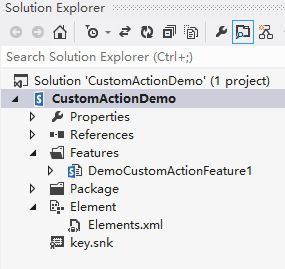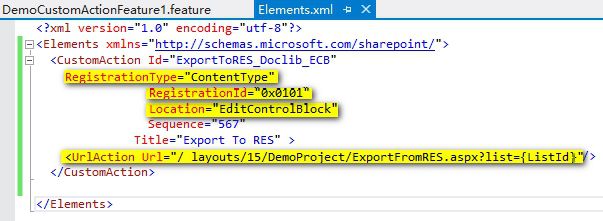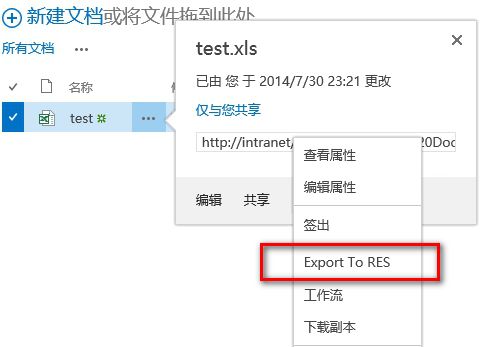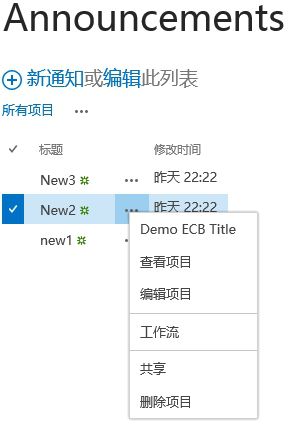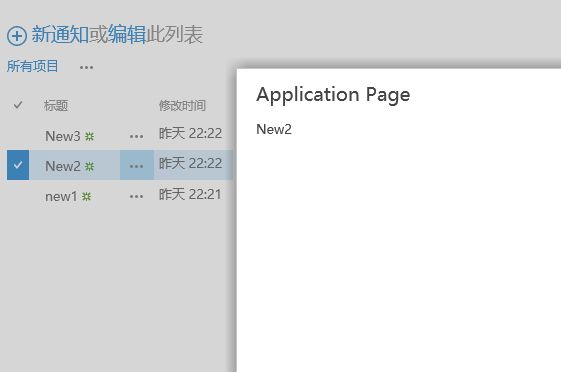- Programmatically Upload a document with new Version to SharePoint List
weixin_30335353
c#
SearchSharePointLegacyVersions-DevelopmentandOtherProgrammingForumSearchAllSharePointProductsandTechnologiesForumsSearchAllMSDNForumsAskaquestionTuesday,April14,20096:44PMda.3vil.geniusda.3vil.genius6
- SharePoint【学习笔记】-- SharePoint 内置字段名/GUID大全
weixin_30525825
这个SharePointInternalFieldNames–SharePoint2010解决大问题了,每次找内置字段名和GUID都很麻烦,这个列表提供了汇总清单,以后查找就方便多了。这份清单列出了每个内置字段的Title(取字段值需要)、GUID(取字段对象需要)、InternalName(CAML需要)。比如,下面的例子取任务列表的“相关内容”链接:1://获取任务列表的“相关内容”链接2:G
- 【转】SharePoint 2010 内置字段名/GUID 大全
weixin_30412013
ui
【更新:原文字段清单全拷贝过来了。】这个SharePointInternalFieldNames–SharePoint2010解决大问题了,每次找内置字段名和GUID都很麻烦,这个列表提供了汇总清单,以后查找就方便多了。这份清单列出了每个内置字段的Title(取字段值需要)、GUID(取字段对象需要)、InternalName(CAML需要)。比如,下面的例子取任务列表的“相关内容”链接:1://
- Vue实现文档在线预览
认证者
vue.js前端javascript
一、OfficeWebViewer(微软)说明1说明1直接在浏览器中打开Word、PowerPoint或Excel文件,将下载链接转换为OfficeWebViewer链接以在您的网站中使用注意:在SharePoint2019中,可插入的文件类型仅限于Word、Excel和PPt,(.doc、.docx、xls、.xlsx、.pot、.potx、.ppt和.pptx)(不支持pdf)。优点:1.没有
- Alist 网盘聚合挂载神器在FreeBSD下编译安装
skywalk8163
项目实践运维服务器freebsd网盘
Alist支持各种主流网盘,全部统一管理,妈妈再也不怕我的网盘太多太乱了!Alist是一个支持各种网盘的神器,它的特点:多种存储本地存储阿里云盘OneDrive/Sharepoint(国际版,世纪互联,de,us)天翼云盘(个人云,家庭云)GoogleDrive123云盘FTP/SFTPPikPakS3Seafile又拍云对象存储WebDav(支持无API的OneDrive/SharePoint)
- 如何使用集成在 SharePoint 中的开源 ONLYOFFICE 文档替代微软 Office
ONLYOFFICE
ONLYOFFICE文档是一款开源的办公套件,在GNUAGPLv3.0下分发。它包括基于网络的查看器和协作编辑器,可用于处理文本文档、电子表格和演示文稿,与OOXML格式高度兼容。ONLYOFFICE文档可以与多种云服务集成,如Nextcloud、ownCloud、Seafile、Alfresco、Plone等,您也可以将其嵌入到您自己的解决方案中。这些编辑器也可以作为完整的效率解决方案ONLYO
- windows 安装sql server 华为云文档
linux实践操作记录
linux服务器运维
先安装net3.5,剩下安装sqlserver步骤看下面文档安装SQLServer_弹性云服务器ECS_最佳实践_搭建MicrosoftSharePointServer2016_华为云(huaweicloud.com)
- 全新SharePoint Embedded介绍
ituff
现代办公巨硬生活码代码microsoftsharepointdevelopment
SharePointEmbedded是一种为企业和独立软件供应商(ISVs)构建自定义内容应用程序的新方法。其提供了一个无头(headless)的API模式,通过在企业现有的Microsoft365租户内存储内容,将协作、安全和合规性等管理能力集成到任何应用程序中。企业可以使用SharePointEmbedded来驱动业务应用程序,为应用程序用户和负责管理这些新应用程序的系统管理员创造一个统一且熟
- 饿了么否认与字节跳动接洽收购;中国AI大模型专利数全球第一;微软SharePoint被曝严重漏洞 | 极客头条
极客日报
人工智能microsoftsharepoint
「极客头条」——技术人员的新闻圈!CSDN的读者朋友们早上好哇,「极客头条」来啦,快来看今天都有哪些值得我们技术人关注的重要新闻吧。整理|苏宓出品|CSDN(ID:CSDNnews)一分钟速览新闻点!饿了么否认与字节跳动接洽收购罗永浩暂缓AR业务转做大模型?内部人士:不实,仍专注AR研发中国电信星辰AI大模型开源消息称理想汽车成立AI技术委员会:统筹全公司AI资源、推进产品落地《王者荣耀》抖音直播
- Linux 系统之部署 ZFile 在线网盘服务
开源极客行
开源项目linux运维
一、ZFile介绍1)ZFile简介官网:https://www.zfile.vip/GitHub:https://github.com/zfile-dev/zfileZFile是一款基于Java的在线网盘程序,支持对接S3、OneDrive、SharePoint、又拍云、本地存储、FTP等存储源,支持在线浏览图片、播放音视频,文本文件等文件类型。2)ZFile特点Docker、DockerCom
- PowerBI:如何在以SharePoint文件做为数据源?
牛猫Data
PowerBIpowerbisharepoint数据分析数据可视化microsoft
问题描述:有朋友最近询问,在PowerBI中如何以SharePoint中的文件做为数据源,进行报告的设计开发?今天抽一些时间,为大家做一个样例,供大家参考。解决方案:找到将要使用的SharePoint中文件的Weblink地址,此步最为关键;打开PowerBI,通过Weblink文件地址,成功文件作为PowerBI数据源;操作步骤:1,在一个测试使用的SharePoint站点,上传我们的测试Exc
- Aspose.Cells Java去除水印和数量限制
罗政
javapython开发语言
什么是Aspose?Aspose是一家开发软件公司,提供众多屡获殊荣的API,开发人员可以使用这些API创建、编辑、转换或渲染Office、OpenOffice、PDF、图像、ZIP、CAD、XPS、EPS、PSD和更多文件格式.API可用于不同的平台,包括.NET、Java、C++、Python、PHP、Xamarin和Android、MicrosoftSharePoint的报告解决方案以及Mi
- 全新SharePoint Premium介绍
ituff
现代办公巨硬生活Data&AIsharepointmicrosoftOffice365ai
在2023年微软Ignite会议中,微软推出了SharePointPremium,这是一个人工智能平台,旨在改变你在云中的内容体验。SharePointPremium是微软Syntex的进化。什么是SharePointSharePoint是微软开发的协作和内容管理平台。自2001年以来可用,主要用于企业。它提供了一套服务,使组织能够在组织内部高效地共享和管理文档、信息和想法。SharePoint允
- Power Automate删除SharePoint Online或OneDrive for Business文件版本历史
ituff
现代办公巨硬生活PowerPlatformsharepointonedrivemicrosoftpowerautomatepowerplatform
SharePointOnline和OneDriveforBusiness支持版本控制,可以保留文件的版本历史,方便用户随时查看和恢复以前的版本。但该功能也会占用大量SharePointOnline或OneDriveforBusiness存储空间。官方删除版本历史的方法无法批量操作,故今天提供一种使用PowerAutomate来删除SharePointOnline或OneDriveforBusine
- 关于Ivanti 曝新的 MobileIron 零日漏洞,正在被恶意利用的动态情报
威胁情报收集站
威胁分析网络安全web安全
一、基本内容美国IT软件公司Ivanti于2023年8月23日提醒客户,一个关键的SentryAPI身份验证绕过漏洞正在被恶意利用。IvantiSentry(前身为MobileIronSentry)在MobileIron部署中充当MicrosoftExchangeServer等企业ActiveSync服务器或Sharepoint服务器等后端资源的守门员,它还可以充当Kerberos密钥分发中心代理
- cs环境部署
longersking
安装配置cs搭建docker
配置搭建cs工具两种方式cs工具=》狐狸工具箱,微信上搜索或者cs-OneDrive(sharepoint.com)提取密码www.ddosi.org需要云服务器(个人猜测如果是靶场的话,可以采用一台所有主机都能访问的主机作为服务端配置)非docker方式搭建将cs整个文件上传到服务器端,这里注意,最好上传版本略低的cs工具,否则会因为服务器内核问题导致无法运行,笔者采用4.7版本,即狐狸工具箱自
- SPS技术体系分析(张永康)
scott_chou
SharePointsharepointstringservice数据库文档microsoft
一、程序文件及IIS配置二、SPS数据库对象分析21.主要数据库表22.主要表及字段23.WindowsSharePointServices存储过程三、SPS封装后的对象分析31.SPS主要对象体系结构32.Microsoft.SharePoint命名空间简介33.WindowsSharePointServicesWebService简介34.SharePoint事件分析四、开发相关资源一、程序文
- SPS技术体系分析(张永康)
iteye_9207
数据库操作系统内存管理
SPS技术体系分析(张永康)2010年07月18日一、程序文件及IIS配置二、SPS数据库对象分析21.主要数据库表22.主要表及字段23.WindowsSharePointServices存储过程三、SPS封装后的对象分析31.SPS主要对象体系结构32.Microsoft.SharePoint命名空间简介33.WindowsSharePointServicesWebService简介34.Sh
- 【Microsoft Azure 的1024种玩法】四十九.在Azure中使用Azure VirtualMachines 搭建Microsoft SharePoint 2016
一只特立独行的兔先森
【MicrosoftAzure的1024种玩法】azuremicrosoftsharepoint
【简介】SharePointServer2016的设计、开发和测试以Microsoft软件即服务(SaaS)战略为核心。SharePointServer2016广泛借鉴了该经验,旨在帮助您实现更高级别的可靠性和性能,并在满足用户对更大业务移动性的需求的同时为用户提供支持,本文主要介绍了如何.在Azure中使用AzureVirtualMachines搭建MicrosoftSharePoint2016
- Dynamic Web TWAIN资讯:Web应用程序的扫描仪SDK
RoffeyYang
DynamicWebTWAINjavaweb
DynamicWebTWAIN是一个专为Web应用程序设计的TWAIN扫描识别控件。你只需在TWAIN接口写几行代码,就可以用兼容TWAIN的扫描仪扫描文档或从数码相机/采集卡中获取图像。然后用户可以编辑图像并将图像保存为多种格式,用户可保存图像到远程数据库或者SharePoint。该TWAIN控件还支持上传和处理本地图像。本文汇集了一些DynamicWebTWAIN编程方面的常见问题,并且针对这
- 从简单DEMO开始学习Power Apps【DAY 2】
m0_64916060
sharepoint
自动化云端流在完成了申请者的功能模块之后,我们需要让我们的申请能够被审核人员看见并且做出回应。同时我们需要对上传的信息以及审核回应的信息进行处理,如果完全由人力去逐个修改,那是很麻烦的。所以,我们就用到了自动化云端流。创建自动化云端流生成新的流打开PowerAutomate,创建自动化云端流,输入流名称并选择触发器为当创建项时在触发器中输入上一篇文章中在SharePoint中创建的数据源的地址,并
- SharePoint-连接Excel
小沐°
SharePoint微软sharepointexcel
PowerAutomate和PowerApps想要连接Excel表格的话,可以在OneDrive或SharePoint网站的文档中创建Excel文件,然后把Excel转换成table表格以SharePoint为例,在文档中点击新建,选择Excel工作簿填写内容,然后全选选中在上方搜索框里输入table,选择表格点击确定这样就是table结构了
- Power Automate-变量和excel表数据的应用
小沐°
PowerAutomateexcel
前提表格PowerAutomate连接excel请参考:SharePoint-连接Excel-CSDN博客需求1:计算表格中某列的和添加操作,搜索变量,选择初始化变量添加变量的名称、类型和初始值再新增操作,搜索Excel,点击查看更多选择列出表中存在的行选择提前在SharePoint网站中的文档创建的excel表格添加新操作,搜索控件,选择应用到每一个选择value然后在里面添加操作,搜索变量,选
- Making SharePoint Web Parts Interact
weixin_34348111
MakingSharePointWebPartsInteract看到www.theserverside.net上面有一篇介绍connectedWebParts开发文章《MakingSharePointWebPartsInteract》byDinoEsposito,推荐!http://www.theserverside.net/articles/showarticle.tss?id=WebParts
- Developing SharePoint WebParts using User Controls and Web Applications
lixintao200702
sharepointwebwebpartsuserapplicationdeployment
DevelopingSharePointWebPartsusingUserControlsandWebApplications92Postedbyggalipeau|Postedon18-05-2009Category:featured,sharepoint,webpart,wspbuilderIfyou’vereadmyblogsbefore,thenyouprobablyknowIamafan
- SharePoint 的 Web Parts 是什么
HoneyMoose
sharepoint
WebParts可以说是微软SharePoint的基础组件。根据微软自己的描述,WebParts是SharePoint对内容进行构建的基础,可以想想成一块一块的砖块。我们需要使用这些砖块来完成一个页面的构建。我们可以利用WebParts在SharePoint中添加文本,图片,文件,视频,甚至是动态内容。添加WebParts在完成页面布局的Section后,单击页面布局上面的Section,上的X号
- SharePoint 是什么
HoneyMoose
sharepoint
SharePoint平台使您能够以在线方式和本地方式轻松地管理和协调业务数据。因为其灵活性和易使用性,公司可以快速采用SharePoint来管理其业务数据。SharePointMicrosoft365一种基于云的服务,由Microsoft托管,适用于各种规模的企业。任何SharePointServer企业都可以订阅Microsoft365计划或独立的SharePointOnline服务,而不是在本
- SharePoint 页面中插入自定义代码
HoneyMoose
sharepoint
我们都知道SharePoint是对页面进行编辑的。对于一些有编程基础的人来说,可能需要对页面中插入代码,这样才能更好的对页面进行配置。但是在新版本的SharePointmodern页面来说,虽然我们可以插入Embed组件。但是Embed组件中是不允许提供Script和Html脚本的。只能插入iFrame框架或者URL地址。这个就非常郁闷了。管理员配置在SharePoint页面中,默认是禁用自定义脚
- SharePoint 优化显示WebParts
anglueao6619
uijavascriptruntimeViewUI
在开发sharepoint中,经常遇到需要自定义显示列表中的一部分作为导航的内容,如公告栏,新闻链接,最新动态等....我们通常需要显示一个列表的标题,并且限制字符长度,外加一些条件,如按创建的时间倒序这样来显示最新的动态,显示的时间也需要转换格式等...那我们来看看原始的列表如下图:修改后的效果:接下来我们用SPD打开这个站点,在sitepages里面新建一个页面,命名为allexception
- SharePoint 的 Web Parts 是什么
HoneyMoose
sharepoint
WebParts可以说是微软SharePoint的基础组件。根据微软自己的描述,WebParts是SharePoint对内容进行构建的基础,可以想想成一块一块的砖块。我们需要使用这些砖块来完成一个页面的构建。我们可以利用WebParts在SharePoint中添加文本,图片,文件,视频,甚至是动态内容。添加WebParts在完成页面布局的Section后,单击页面布局上面的Section,上的X号
- java封装继承多态等
麦田的设计者
javaeclipsejvmcencapsulatopn
最近一段时间看了很多的视频却忘记总结了,现在只能想到什么写什么了,希望能起到一个回忆巩固的作用。
1、final关键字
译为:最终的
&
- F5与集群的区别
bijian1013
weblogic集群F5
http请求配置不是通过集群,而是F5;集群是weblogic容器的,如果是ejb接口是通过集群。
F5同集群的差别,主要还是会话复制的问题,F5一把是分发http请求用的,因为http都是无状态的服务,无需关注会话问题,类似
- LeetCode[Math] - #7 Reverse Integer
Cwind
java题解MathLeetCodeAlgorithm
原题链接:#7 Reverse Integer
要求:
按位反转输入的数字
例1: 输入 x = 123, 返回 321
例2: 输入 x = -123, 返回 -321
难度:简单
分析:
对于一般情况,首先保存输入数字的符号,然后每次取输入的末位(x%10)作为输出的高位(result = result*10 + x%10)即可。但
- BufferedOutputStream
周凡杨
首先说一下这个大批量,是指有上千万的数据量。
例子:
有一张短信历史表,其数据有上千万条数据,要进行数据备份到文本文件,就是执行如下SQL然后将结果集写入到文件中!
select t.msisd
- linux下模拟按键输入和鼠标
被触发
linux
查看/dev/input/eventX是什么类型的事件, cat /proc/bus/input/devices
设备有着自己特殊的按键键码,我需要将一些标准的按键,比如0-9,X-Z等模拟成标准按键,比如KEY_0,KEY-Z等,所以需要用到按键 模拟,具体方法就是操作/dev/input/event1文件,向它写入个input_event结构体就可以模拟按键的输入了。
linux/in
- ContentProvider初体验
肆无忌惮_
ContentProvider
ContentProvider在安卓开发中非常重要。与Activity,Service,BroadcastReceiver并称安卓组件四大天王。
在android中的作用是用来对外共享数据。因为安卓程序的数据库文件存放在data/data/packagename里面,这里面的文件默认都是私有的,别的程序无法访问。
如果QQ游戏想访问手机QQ的帐号信息一键登录,那么就需要使用内容提供者COnte
- 关于Spring MVC项目(maven)中通过fileupload上传文件
843977358
mybatisspring mvc修改头像上传文件upload
Spring MVC 中通过fileupload上传文件,其中项目使用maven管理。
1.上传文件首先需要的是导入相关支持jar包:commons-fileupload.jar,commons-io.jar
因为我是用的maven管理项目,所以要在pom文件中配置(每个人的jar包位置根据实际情况定)
<!-- 文件上传 start by zhangyd-c --&g
- 使用svnkit api,纯java操作svn,实现svn提交,更新等操作
aigo
svnkit
原文:http://blog.csdn.net/hardwin/article/details/7963318
import java.io.File;
import org.apache.log4j.Logger;
import org.tmatesoft.svn.core.SVNCommitInfo;
import org.tmateso
- 对比浏览器,casperjs,httpclient的Header信息
alleni123
爬虫crawlerheader
@Override
protected void doGet(HttpServletRequest req, HttpServletResponse res) throws ServletException, IOException
{
String type=req.getParameter("type");
Enumeration es=re
- java.io操作 DataInputStream和DataOutputStream基本数据流
百合不是茶
java流
1,java中如果不保存整个对象,只保存类中的属性,那么我们可以使用本篇文章中的方法,如果要保存整个对象 先将类实例化 后面的文章将详细写到
2,DataInputStream 是java.io包中一个数据输入流允许应用程序以与机器无关方式从底层输入流中读取基本 Java 数据类型。应用程序可以使用数据输出流写入稍后由数据输入流读取的数据。
- 车辆保险理赔案例
bijian1013
车险
理赔案例:
一货运车,运输公司为车辆购买了机动车商业险和交强险,也买了安全生产责任险,运输一车烟花爆竹,在行驶途中发生爆炸,出现车毁、货损、司机亡、炸死一路人、炸毁一间民宅等惨剧,针对这几种情况,该如何赔付。
赔付建议和方案:
客户所买交强险在这里不起作用,因为交强险的赔付前提是:“机动车发生道路交通意外事故”;
如果是交通意外事故引发的爆炸,则优先适用交强险条款进行赔付,不足的部分由商业
- 学习Spring必学的Java基础知识(5)—注解
bijian1013
javaspring
文章来源:http://www.iteye.com/topic/1123823,整理在我的博客有两个目的:一个是原文确实很不错,通俗易懂,督促自已将博主的这一系列关于Spring文章都学完;另一个原因是为免原文被博主删除,在此记录,方便以后查找阅读。
有必要对
- 【Struts2一】Struts2 Hello World
bit1129
Hello world
Struts2 Hello World应用的基本步骤
创建Struts2的Hello World应用,包括如下几步:
1.配置web.xml
2.创建Action
3.创建struts.xml,配置Action
4.启动web server,通过浏览器访问
配置web.xml
<?xml version="1.0" encoding="
- 【Avro二】Avro RPC框架
bit1129
rpc
1. Avro RPC简介 1.1. RPC
RPC逻辑上分为二层,一是传输层,负责网络通信;二是协议层,将数据按照一定协议格式打包和解包
从序列化方式来看,Apache Thrift 和Google的Protocol Buffers和Avro应该是属于同一个级别的框架,都能跨语言,性能优秀,数据精简,但是Avro的动态模式(不用生成代码,而且性能很好)这个特点让人非常喜欢,比较适合R
- lua set get cookie
ronin47
lua cookie
lua:
local access_token = ngx.var.cookie_SGAccessToken
if access_token then
ngx.header["Set-Cookie"] = "SGAccessToken="..access_token.."; path=/;Max-Age=3000"
end
- java-打印不大于N的质数
bylijinnan
java
public class PrimeNumber {
/**
* 寻找不大于N的质数
*/
public static void main(String[] args) {
int n=100;
PrimeNumber pn=new PrimeNumber();
pn.printPrimeNumber(n);
System.out.print
- Spring源码学习-PropertyPlaceholderHelper
bylijinnan
javaspring
今天在看Spring 3.0.0.RELEASE的源码,发现PropertyPlaceholderHelper的一个bug
当时觉得奇怪,上网一搜,果然是个bug,不过早就有人发现了,且已经修复:
详见:
http://forum.spring.io/forum/spring-projects/container/88107-propertyplaceholderhelper-bug
- [逻辑与拓扑]布尔逻辑与拓扑结构的结合会产生什么?
comsci
拓扑
如果我们已经在一个工作流的节点中嵌入了可以进行逻辑推理的代码,那么成百上千个这样的节点如果组成一个拓扑网络,而这个网络是可以自动遍历的,非线性的拓扑计算模型和节点内部的布尔逻辑处理的结合,会产生什么样的结果呢?
是否可以形成一种新的模糊语言识别和处理模型呢? 大家有兴趣可以试试,用软件搞这些有个好处,就是花钱比较少,就算不成
- ITEYE 都换百度推广了
cuisuqiang
GoogleAdSense百度推广广告外快
以前ITEYE的广告都是谷歌的Google AdSense,现在都换成百度推广了。
为什么个人博客设置里面还是Google AdSense呢?
都知道Google AdSense不好申请,这在ITEYE上也不是讨论了一两天了,强烈建议ITEYE换掉Google AdSense。至少,用一个好申请的吧。
什么时候能从ITEYE上来点外快,哪怕少点
- 新浪微博技术架构分析
dalan_123
新浪微博架构
新浪微博在短短一年时间内从零发展到五千万用户,我们的基层架构也发展了几个版本。第一版就是是非常快的,我们可以非常快的实现我们的模块。我们看一下技术特点,微博这个产品从架构上来分析,它需要解决的是发表和订阅的问题。我们第一版采用的是推的消息模式,假如说我们一个明星用户他有10万个粉丝,那就是说用户发表一条微博的时候,我们把这个微博消息攒成10万份,这样就是很简单了,第一版的架构实际上就是这两行字。第
- 玩转ARP攻击
dcj3sjt126com
r
我写这片文章只是想让你明白深刻理解某一协议的好处。高手免看。如果有人利用这片文章所做的一切事情,盖不负责。 网上关于ARP的资料已经很多了,就不用我都说了。 用某一位高手的话来说,“我们能做的事情很多,唯一受限制的是我们的创造力和想象力”。 ARP也是如此。 以下讨论的机子有 一个要攻击的机子:10.5.4.178 硬件地址:52:54:4C:98
- PHP编码规范
dcj3sjt126com
编码规范
一、文件格式
1. 对于只含有 php 代码的文件,我们将在文件结尾处忽略掉 "?>" 。这是为了防止多余的空格或者其它字符影响到代码。例如:<?php$foo = 'foo';2. 缩进应该能够反映出代码的逻辑结果,尽量使用四个空格,禁止使用制表符TAB,因为这样能够保证有跨客户端编程器软件的灵活性。例
- linux 脱机管理(nohup)
eksliang
linux nohupnohup
脱机管理 nohup
转载请出自出处:http://eksliang.iteye.com/blog/2166699
nohup可以让你在脱机或者注销系统后,还能够让工作继续进行。他的语法如下
nohup [命令与参数] --在终端机前台工作
nohup [命令与参数] & --在终端机后台工作
但是这个命令需要注意的是,nohup并不支持bash的内置命令,所
- BusinessObjects Enterprise Java SDK
greemranqq
javaBOSAPCrystal Reports
最近项目用到oracle_ADF 从SAP/BO 上调用 水晶报表,资料比较少,我做一个简单的分享,给和我一样的新手 提供更多的便利。
首先,我是尝试用JAVA JSP 去访问的。
官方API:http://devlibrary.businessobjects.com/BusinessObjectsxi/en/en/BOE_SDK/boesdk_ja
- 系统负载剧变下的管控策略
iamzhongyong
高并发
假如目前的系统有100台机器,能够支撑每天1亿的点击量(这个就简单比喻一下),然后系统流量剧变了要,我如何应对,系统有那些策略可以处理,这里总结了一下之前的一些做法。
1、水平扩展
这个最容易理解,加机器,这样的话对于系统刚刚开始的伸缩性设计要求比较高,能够非常灵活的添加机器,来应对流量的变化。
2、系统分组
假如系统服务的业务不同,有优先级高的,有优先级低的,那就让不同的业务调用提前分组
- BitTorrent DHT 协议中文翻译
justjavac
bit
前言
做了一个磁力链接和BT种子的搜索引擎 {Magnet & Torrent},因此把 DHT 协议重新看了一遍。
BEP: 5Title: DHT ProtocolVersion: 3dec52cb3ae103ce22358e3894b31cad47a6f22bLast-Modified: Tue Apr 2 16:51:45 2013 -070
- Ubuntu下Java环境的搭建
macroli
java工作ubuntu
配置命令:
$sudo apt-get install ubuntu-restricted-extras
再运行如下命令:
$sudo apt-get install sun-java6-jdk
待安装完毕后选择默认Java.
$sudo update- alternatives --config java
安装过程提示选择,输入“2”即可,然后按回车键确定。
- js字符串转日期(兼容IE所有版本)
qiaolevip
TODateStringIE
/**
* 字符串转时间(yyyy-MM-dd HH:mm:ss)
* result (分钟)
*/
stringToDate : function(fDate){
var fullDate = fDate.split(" ")[0].split("-");
var fullTime = fDate.split("
- 【数据挖掘学习】关联规则算法Apriori的学习与SQL简单实现购物篮分析
superlxw1234
sql数据挖掘关联规则
关联规则挖掘用于寻找给定数据集中项之间的有趣的关联或相关关系。
关联规则揭示了数据项间的未知的依赖关系,根据所挖掘的关联关系,可以从一个数据对象的信息来推断另一个数据对象的信息。
例如购物篮分析。牛奶 ⇒ 面包 [支持度:3%,置信度:40%] 支持度3%:意味3%顾客同时购买牛奶和面包。 置信度40%:意味购买牛奶的顾客40%也购买面包。 规则的支持度和置信度是两个规则兴
- Spring 5.0 的系统需求,期待你的反馈
wiselyman
spring
Spring 5.0将在2016年发布。Spring5.0将支持JDK 9。
Spring 5.0的特性计划还在工作中,请保持关注,所以作者希望从使用者得到关于Spring 5.0系统需求方面的反馈。
